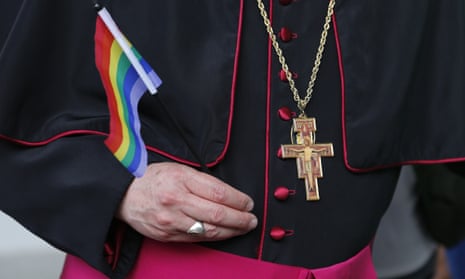If every house of worship were like mine, LGBT Americans of all faiths would enjoy full and permanent equal rights in our society. After Sunday’s service, many long-time parishioners in the largely traditional, Afro-Caribbean congregation where I serve as priest lined up to congratulate my husband and me on the US supreme court’s marriage equality ruling.
Whether my congregants’ sentiment will be echoed in houses of worship throughout the country remains to be seen, but now that the court has issued a final decision on marriage, the pew will replace the judge’s bench as the final arbiter of equality. If LGBT Americans and their allies want to secure the gains made this week, they must see religious denominations as essential allies whose tremendous power in forming policy is crucial to permanent and lasting change.
It would be foolish to underestimate the influence of religion on US politics and social policy. According to the Pew Research Center, more than three quarters of Americans claim a religious affiliation, and fully 40% of voters in the 2014 election attended weekly religious services. Because belief is such a powerful driver of moral sensibility, religious people convinced of a divine mandate for homophobia and transphobia will never abandon their prejudice.
US politicians know this. Bills that would legalize discrimination on religious grounds against LGBT people over adoption, employment or housing have been introduced in more than half of the country’s state legislatures this year alone. If lawmakers continue to perceive that religious voters will back efforts to maintain inequality, then we run the risk of creating a permanent political struggle that pits faith against inclusion. The result for the same-sex marriage ruling, Obergefell v Hodges, would be a situation similar to the ongoing fight over abortion rights. Roe v Wade legalized abortion, but attempts to overturn all or parts of it rage on amid a never-ending culture war.
Entrenched political opposition to LGBT rights on religious grounds is already forming, and it is taking two shapes. One is the overt politico-theology of figures like Republican presidential candidate Mike Huckabee, who invoked “the laws of nature or of nature’s God” in his response to the decision. While Huckabee may only be polling fifth in the crowded Republican field, it’s easy to see in him a political avatar of a pervasive sensibility.
The second wing of resistance is more widely palatable, yet less honest, and it seeks shelter under the banner of “religious liberty” – implying that same-sex marriage shouldn’t be enforced if it interferes with someone’s faith. This was the chosen response of primary frontrunners Jeb Bush and Scott Walker, and is seen as a progressive innovation for candidates trying placate voters on both sides of the issue. Yet nothing about the court’s decision will compel a priest or pastor to marry a same-sex couple, or preach a sermon about justice for gays and lesbians or even welcome a transgender person to church. At best, this argument is scapegoating and fear-mongering. At worst, it is, for people of faith like me, a gross distortion of our dearly held Christian belief in justice and unconditional love.
Contrary to the dominant media and political narratives, churches are not monolithic in their opposition to marriage equality or full inclusion of LGBT people in society. The Episcopal Church, home to American members of the global Anglican Communion, on Saturday elected a new presiding bishop who supports same-sex marriage and is set to approve measures making marriage equality possible in all its parishes. Most mainline Protestant denominations are at least discussing similar measures.
Yet there is also ample movement in Christian bodies that have consistently opposed full inclusion. Regardless of their leaders’ official policies, a majority of Roman Catholics in the United States support same-sex marriage. And among Evangelical Christians, leaders are emerging who are beginning to question the traditional orthodoxy on sexual orientation and gender identity. Many thoughtful Christians are learning that Jesus says nothing about homosexuality and very little about marriage itself. He does proclaim that the entire religious law rests on love of God and neighbor.
As of now, LGBT people are much less likely to be religious than their heterosexual counterparts. With a bit of curiosity and luck in finding the right community, perhaps more of them will find their way back into religion to transform it from the inside. After all, to be queer is to walk the spiritual path from fear to faith in the authenticity of one’s own truth and experience.
